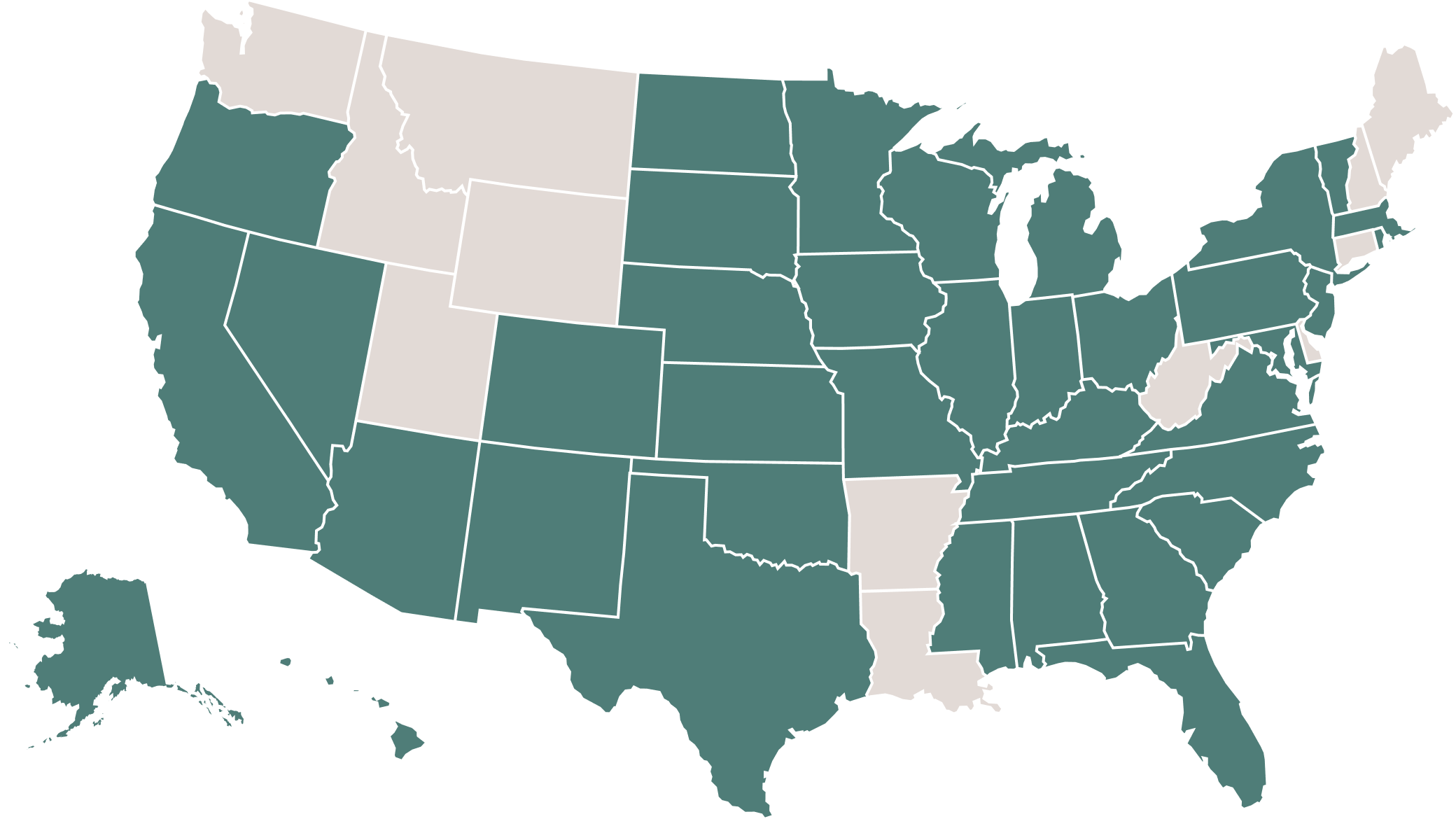Our impact
Our team of public health experts works diligently to help advocates across the country create meaningful policy and systems change for their communities. Since our founding in 2012, we have partnered with more than 30 state agencies, 50 local communities, and 12 national organizations. Alongside these partners, we have played a part in supporting more than 75 policy change initiatives. And these policies have played a significant part in improving public health outcomes for all.
Our reach
The map below highlights the states in which we’ve made a difference so far — and we can’t wait to continue to expand our reach in the years to come.

Our partners






We work alongside national, state, and local organizations, ranging from government agencies and nonprofits to universities and educational institutions. These partnerships we’ve forged and communities we support span diverse geographic, demographic, and political backgrounds.
All of our partners have a unique story to tell, and we are here to empower them to tell it in a way that leads to policy change and promotes health equity.
Hear what they have to say
“They are thorough, responsive, and professional. The Counter Tools staff is reliable and timely.”
“Innovative, engaging, and will help continue momentum for local policy action.”
“Counter Tools brings the expertise and education our youth need. The broader, deeper learning experience they provide gets our young people thinking Big Picture — about how they can get out and contribute to their local community AND change the world.”
“I can’t say enough about how much I appreciate and value our partnership. We couldn’t be happier with the expertise, the TA, the software — everything. With your help, we have completely reinvented our Synar program and have become one of the leaders across the state.”
Success stories
Our partners have achieved great successes in public health. We recognize their hard work and leadership in creating healthier communities. We hope these stories inspire your work around place-based public health.
Florida Department of Health’s Bureau of Tobacco-Free Florida
Florida’s Alachua County — Leading the way on tobacco retailer licensing, tobacco 21, and restrictions near schools
Counter Tools has partnered with Florida since 2013 to survey the retail environment and spread awareness around healthy retail, and in more recent years the work has shifted focus to passing policies. In January 2019, Alachua County implemented a local tobacco retailer licensing policy, raised the minimum legal sales age for tobacco to 21, and required any new tobacco retailers to be located at least 1,000 feet away from schools. Read more.
Kansas Department of Health and Environment
Kansas high schoolers participate in summer project to learn about the tobacco retail environment
Counter Tools supported the Kansas Department of Health and Environment (KDHE) to address two of their identified priority areas: 1) preventing the initiation of tobacco use among youth and young adults and 2) addressing tobacco-related health inequities. This included point-of-sale training for KDHE’s Chronic Disease and Risk Reduction community grantees as well as youth Resist Chapters across the state. Following these training sessions, KDHE asked Counter Tools to lead a point-of-sale focused summer project for interested Resist Chapters. Read more.
Minnesota Department of Health
Using local data to pass policies for tobacco prevention in Golden Valley, Minnesota
Counter Tools has partnered with Minnesota since 2012 to help support local areas in the state in their pursuit of policy change around tobacco. In 2019, the city of Golden Valley in Hennepin County, Minnesota passed a number of comprehensive tobacco prevention policies, including raising the minimum legal sales age to 21, banning the sale of flavored tobacco products, increasing tobacco product pricing, capping the number of tobacco retailer licenses issued, and more. In 2020, they passed additional regulations to restrict the location of tobacco retailers and their proximity to youth-oriented facilities. The use of local data, education efforts, and strong political and community support helped pass these policies. Read more.
Wisconsin Department of Health Services
Addressing and improving the landscape of food and alcohol products in stores — a Wisconsin success story
Counter Tools has partnered with Wisconsin since 2016 to assist with data collection; provide understanding of trends; and support change related to tobacco, alcohol, and food products in the retail environment. Wisconsin Department of Health Services implemented the Wisconsin Retail Assessment Project (WRAP) to increase knowledge about the retail environment, identify disparities, foster community awareness, and build public support toward interventions. Wisconsin serves as a good example of the importance of better understanding the retail environment through data collection, cross-sector collaboration efforts, and increasing access to healthy products for the betterment of population health. Read more.
Reality Check
Youth empowerment and advocacy — Reality Check’s fight against the tobacco industry
Reality Check empowers youth to become leaders and fight against the tobacco industry through grassroots mobilization and education. Counter Tools has partnered with Reality Check since 2015 and conducts training sessions to educate youth on tobacco and advocacy work through rallying at the annual Altria shareholder’s meeting. Read more.
Virginia Department of Behavioral Health and Development Services
Assessing 100% of tobacco retailers: Virginia’s ground truthing project
Virginia and Counter Tools entered into a project in 2015 to create an accurate state-wide tobacco retailer list, utilizing data integration and ground truthing work. Deepening local understanding of the effect of the tobacco retailer environment on health enabled Virginia to develop a statewide infrastructure for tobacco use prevention and control. Read more.
Let’s connect
We’d love to hear more about your goals for your community — and we hope you’ll join us in creating meaningful change. Contact us at [email protected] or fill out the form below.

